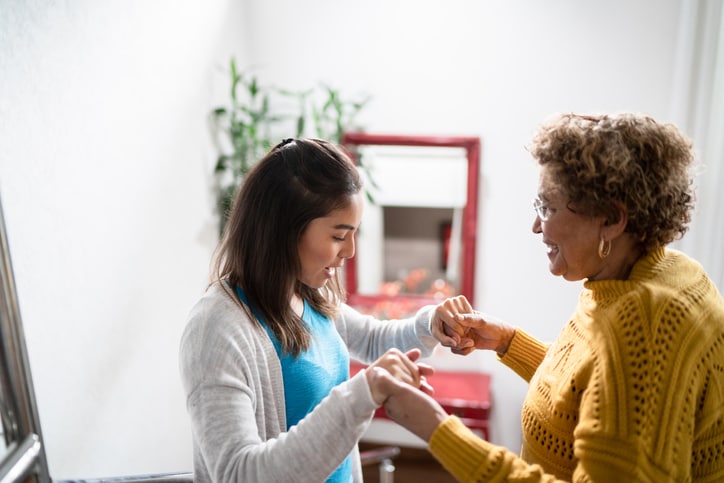When actor Michael J. Fox, famous for his roles in “Back to the Future” and “Family Ties,” announced that he had been diagnosed with Parkinson’s disease at the age of 29, it shone a spotlight on a disorder that was seldom visible in society — a grueling, degenerative condition that affects a person’s speech and mobility. In interviews with Fox at the time (rare as they were), he’d often exhibit those telltale Parkinson’s symptoms.
But while those movement- and speech-related effects of Parkinson’s disease were the most prominent to America when Fox appeared onscreen, what wasn’t so apparent was the condition’s direct tie to cognitive impairment and memory loss.
According to Dr. Egilius L.H. Spierings, a neurologist at MedVadis Research in Boston, cognitive impairment — including dementia — and Parkinson’s disease are often synonymous.
What is Parkinson’s dementia?
According to Spierings, Parkinson’s dementia is not the same as other types of dementia, including Alzheimer’s disease. And, in comparison to other forms of dementia, Parkinson’s dementia is also often overlooked when it comes to emerging research and studies surrounding the disease (Spierings notes that it tends to receive fewer funding dollars.).
“Most people think of Parkinson’s disease as a movement disorder, in which a patient experiences tremor, stiffness and slowing of movement,” says Spierings. “In reality, Parkinson’s disease can also result in cognitive impairment, with studies suggesting that between 50 to 80% of people afflicted with this condition experience dementia.”
“Parkinson’s disease can result in cognitive impairment, with studies suggesting that between 50 to 80% of people afflicted with this condition experience dementia.”
— Dr. Egilius L.H. Spierings, neurologist at MedVadis Research
Here, Spierings and other experts outline the symptoms of Parkinson’s dementia, how it’s diagnosed and more.
Symptoms of Parkinson’s dementia
Not everyone who is diagnosed with Parkinson’s will also experience cognitive impairment and dementia, according to Spierings, but for those who do, dementia symptoms tend to set in 10 to 15 years following a diagnosis. Of course, that’s not always true — when dementia and motor-related symptoms set in simultaneously, patients are often diagnosed with dementia with Lewy Bodies (DLB), according to the Parkinson’s Foundation.
Like Alzheimer’s, Spierings says that initial symptoms of Parkinson’s dementia (and the progression of the disease) can be harder to detect in early stages. He notes, however, that a few key behavioral changes can often lead to a diagnosis. They include:
- Increased changes in memory or judgment
- Anxiety
- Changes in mood and/or personality
- Decreased appetite
- Frequent sleep disturbances
When does Parkinson’s dementia occur?
As for what age Parkinson’s dementia typically sets in, James Giordano, who holds his doctorate in biopsychology and is a professor of neurology at Georgetown University Medical Center, says that middle age tends to be the most common.
“Given that Parkinson’s disease can occur at almost any age, it is most common for movement signs and symptoms to occur during the late 40s to mid-50s, with a progressive worsening over decades,” says Giordano.
How you can tell the difference between Alzheimer’s and other forms of dementia
As mentioned above, Parkinson’s dementia, Alzheimer’s and other forms of dementia tend to have key signifiers when setting in. But as Giordano explains, one key differentiator between the two lies in the span of memory loss.
“The early signs of Parkinson’s dementia include problems with both short and long-term memory, planning and mood,” he notes. “Unlike Alzheimer’s dementia, which is characterized by disruption of short-term memory, at least initially, Parkinson’s dementia tends to involve both short- and long-term memory.”
Spierings adds that patients with Parkinson’s dementia more frequently experience impairments in executive functioning and speed of thinking and mood, whereas Alzheimer’s patients tend to have trouble with language and memory. “Parkinson’s dementia patients are also at a greater risk for hallucinations and paranoid thinking,” he adds.
Although there is no cure for Parkinson’s dementia, or a way to stop the disease’s progression, there are FDA-approved treatments available to help curb some of the symptoms, says Dr. Giordano. He notes that these include cholinesterase-inhibitor drugs like donepezil, galantamine and rivastigmine.
Caring for someone with Parkinson’s dementia
Parkinson’s dementia can be challenging for both the person dealing with the disease and their loved ones. But as a caregiver in their life, you offer one of the most critical components of their treatment.
Here, experts outline the best ways to care for someone with Parkinson’s dementia.
“Speak to your loved one in a calm and quiet manner. Raised voices and displays of frustration will typically worsen an already challenging situation.”
— Dr. Egilius L.H. Spierings, neurologist at MedVadis Research
1. Set a daily routine and stick with it
Tina M. Baxter, a gerontological nurse practitioner, says one of the most effective ways to support Parkinson’s dementia patients is through structure.
“Stick to a routine or structured schedule to avoid confusing the person,” she explains, noting that this can be done in a few ways:
- Wake up and go to bed at the same time each day.
- Ensure meals occur at the same time each day.
- Engage in some time of pre- and post-bathing ritual (i.e. a bath right after dinner).
“A set schedule can lessen a patient’s anxiety and agitation,” adds Spierings.
2. Avoid offer too many options
On a similar note, Baxter tends to keep the options her patients have fairly limited to keep things simple. “Avoid complicated instructions with caregiving [for someone with Parkinson’s dementia],” she explains. “For example, instead of offering the entire closet of shirts to choose from, only offer one or two options.”
She also says that putting these types of tasks in a step-by-step format can help, too. “In lieu of asking that person to put on their pants, shirts, socks and shoes all at once, break it down step-by-step with one task at a time,” she explains. “Be encouraging without being patronizing.”
3. Create clear, clutter-free pathways
Just as you’d remove the clutter of choice from a Parkinson’s dementia patient’s life by setting a routine and limiting options, you can declutter that person’s home to enhance their safety, notes Spierings.
“Simplifying the home environment can reduce visual stimulation and help improve the patient’s difficulties with disorientation and even memory,” he explains. “Use of a nightlight can also be very helpful in reducing the confusion and visual hallucinations that can occur during the night.”
Baxter agrees, noting that nightlights are often key in helping her patients avoid visual misperceptions, such as strange shadows, that can lead to Parkinson’s dementia-triggered hallucinations.
3. Communicate effectively
For Spierings, one tip he often advises to caregivers for Parkinson’s dementia patients is to use communication to your advantage.
“Speak to your loved one in a calm and quiet manner,” he suggests. “Patients with Parkinson’s dementia can become agitated [from] their struggles with communication due to memory impairment. Raised voices and displays of frustration on the part of the caregiver will typically worsen an already challenging situation.”
4. Keep in close, regular contact with the patient’s care team
As a person with Parkinson’s dementia will have some cognitive impairment, it’s critical for caregivers to be the main point-of-contact among the loved one’s care team, says Baxter.
“Discuss any problem behaviors with the person’s health care provider as medication changes, infections and illnesses can cause some confusion [for a person with Parkinson’s dementia],” she notes. She adds that, in her experience caring for patients, many medications for the disease can lose effectiveness or have on-and-off effectiveness. So it’s critical to monitor the loved one’s progress.
Most importantly, says Spierings, whenever initiating a new treatment protocol, caregivers should work closely with a doctor familiar with Parkinson’s disease.




